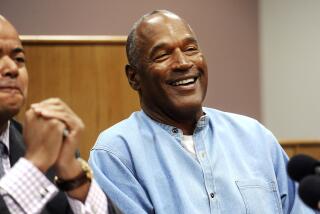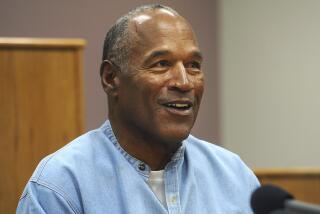You Read the Books, Now See the Movie . . . If You Must
Echoing other high-profile crimes, the Simpson-Goldman killings have tapped an entrepreneurial spirit in the United States otherwise known as greed.
Even as the nation continues to wobble on spindly fiscal legs, boom economic times appear to have embraced the double-homicide horror that has much of the media transfixed and profiteers panting like O.J. groupies. As affirmed by tonight’s arrival on cue of the feeble Fox movie “The O.J. Simpson Story,” they’re open for business, symbolically cheering on the Juice from a freeway overpass, hoping to hitch a ride to the bank.
These crime dogs may not adore the man, who after all is on trial for the grisly killings of his ex-wife Nicole Brown Simpson and Ronald Lyle Goldman. But they do adore the moola.
Faye Resnick is one whose flame flickered briefly, and many others have sought to milk this cash cow. The biggest profiteer now, ironically, may be Simpson himself, whose just-released “I Want to Tell You”--a jailhouse book and accompanying audiotape that should be retitled “I Want to Sell You”--is reportedly doing brisk business. Well, no wonder, given thick slabs of TV time allotted the tape (on which Simpson boldly proclaims his innocence) and Simpson’s chum and co-author, Lawrence Schiller, who launched his own marketing campaign Friday by chatting “exclusively” with CNN’s Larry King and ABC’s Barbara Walters.
The cleverest of the self-serving pro-Simpson spinners, though, may be that consummate media “bud,” attorney Alan Dershowitz, who has been making the round of TV interview and schmooze shows, at once chatting up his client (he’s on Simpson’s defense team) and his own recently published book, “The Abuse Excuse and Other Cop-Outs, Sob Stories and Evasions of Responsibilities.” Always a smoothie, Dershowitz outdid even himself on NBC’s “Today” last week when, in a single withering sentence for the ages, he managed to extol Simpson, summarize “The Abuse Excuse” and slip in the title (“Chutzpah”) of his previous book.
Meanwhile, cable’s Arts & Entertainment Network, which rosily sees itself as a bastion of culture, was not too high-toned to do a little grubbing of its own last week. Its airing of an O.J. Simpson biography (ending with his being arraigned on murder charges) was surely timed to capitalize on the start of the trial. Although a humdrum rehash, the program did offer an intriguing sound bite from an old TV interview in which Simpson discussed learning professional acting after a career as a jock: “Well, you do a lot of B.S.ing, which I’ve always done.”
When it comes to sheer opportunism with no redeeming cultural or educational benefit, however, Fox’s unneeded, unjustified, unrewarding Simpson movie is astride the exploitation curve.
Executive producer Robert Lovenheim is behind this quickie. Yes, this is the one that those caring, sensitive, benevolent, do-gooding folks at Fox chose to postpone in September--only after being widely savaged for planning to air it before selection of a jury, when it might have swayed prospective jurors.
With Bobby Hosea (another football player turned actor) as the adult O.J. and Jessica Tuck as Nicole, this account of the former football great does “a little B.S.ing” in critical spots, but largely sticks to the record. It uses a series of formulaic flashbacks to follow Simpson from his troubled youth in a San Francisco ghetto to his televised flight from police in that white Ford Bronco after becoming the prime suspect in the slaying of his former wife and Goldman. Typically, the all-but-ignored victim is Goldman, who surfaces here briefly as little more than an asterisk.
While neither indicting nor exonerating Simpson, the movie does, in effect, try to have it both ways, wrapping itself in a sort of inky ambiguity. Thus, in addition to lacking sustaining resonance as drama, it has no consistent point of view.
The Simpson in Stephen Harrigan’s script is often caring and generous. Also depicted here, however, are some of the episodes of domestic violence that prosecutors plan to use against Simpson in his trial.
Although lacking Simpson’s charisma, Hosea is persuasive as the volatile, erratic O.J. of stutter-stepping moods, the womanizing protagonist who can explode with rage and physical violence. The target is not only Nicole but at one point also his first wife, Marguerite, whom he charges and tries to rough up in the movie after blaming her for the accidental drowning of their young daughter. (On ABC’s “20/20” last week, Marguerite vigorously denied ever being physically abused by O.J.)
After portraying a violent side of Simpson, the movie offers no alternative scenario that would either buttress Simpson’s defense or contradict the prosecution’s contention that he’s guilty.
Yet, curiously, it still manages somehow to portray Simpson ultimately as a martyr, a sort of dazed, whimpering, tragic hero who is contemplating shooting himself (“Let me do it. I want to be with Nicole”), not escape, in the Bronco driven by his childhood friend A.C. Cowlings (David Roberson). About to be taken into custody near the end of his freeway odyssey, he recalls what he was told by Willie Mays as a kid: “The only thing that endures is character.” Whoa!
Although there’s little in the movie to substantiate it, we’re apparently meant to conclude on faith that Simpson himself has enduring character, just because the script says so. It’s easy to doubt the authenticity of the movie’s Bronco dialogue (“What’s all this about?” babbles a distraught, disoriented O.J. “It’s about some other dude, man, some other guy,” A.C. replies), but not that it’s supposed to engender sympathy and tears for a man who earlier in the movie is seen clobbering his wife Nicole.
We can infer from this numbing inconsistency that the filmmakers themselves haven’t a clue about their subject--which, in the present climate, perfectly qualifies them to tell and profit from this story.
* “The O.J. Simpson Story” airs at 8 tonight on Fox (Channels 11 and 6).
More to Read
Sign up for our Book Club newsletter
Get the latest news, events and more from the Los Angeles Times Book Club, and help us get L.A. reading and talking.
You may occasionally receive promotional content from the Los Angeles Times.








